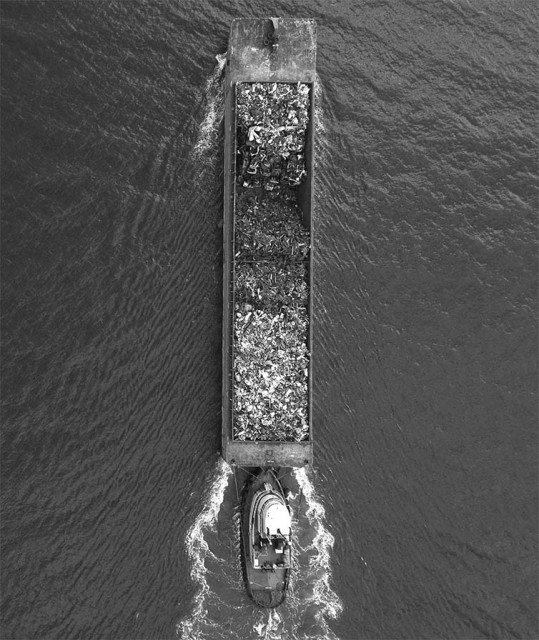Trash talk: why China’s banned our recycling & how it’s the kick in the pants Canada needs
May 2, 2018
In a riot of clamouring bottles and backfiring brakes, a week’s worth of your trash gets trucked off to be recycled. It’s all very comforting to those of us who brag that we recycle everything – unless, like half the planet, your town was selling your discards to China.
After years of buying over 50 per cent of the world’s scrap paper and plastic to fuel its growing resource-hungry economy, China announced it’s through with being the world’s “garbage dump” and, as of January 1, barred imports of our recycling it says are too often contaminated with garbage and even hazardous waste.
Faster than Canadians could mumble, “Wait, what, we send recycling to China?” mountains of our binned waste started piling up in ports and warehouses from Kamloops in British Columbia to Halifax in the east. With half the recycling market dried up and a glut of recyclables lowering prices, municipalities in Canada and around the globe are playing a cutthroat game of musical chairs as they scramble to find new markets willing to take on our endless tsunami of packaging waste.
If you ask them how they’re coping, most Canadian recyclers will give you mealy mouthed answers that everything is fine, but is it? Dig down past the heaps of paper and plastic orphaned by the Chinese rule change and you’ll find a recycling system in deep disrepair. Considering Canada produces more waste per capita than any other developed nation and nearly three-quarters of that waste still ends up in landfill, now may be the perfect time to tackle our trashy habits.
Canadian municipalities have yet to go as far as some American and Australian towns that are suspending curbside recycling pickups, but the China crackdown has undeniably left many Canadian towns in the lurch. Last checked, Calgary, which sent 50 per cent of its recycling to China, was warehousing 10,000 tonnes of recyclables, and counting, with nowhere to go. In Halifax, where roughly 80 per cent of recycling was going to China, 100 tonnes of plastic bags and other low-quality plastic film has been trucked to out-of-province landfills. Halifax’s recycling manager Matthew Keliher says, at this point it’s found new homes for most of its recyclables (“that could change next week”), but new loads of shopping bags, bread bags and the like are being burned as fuel at Canadian cement kilns. Not quite the happy 3R ending Haligonians would expect from popping plastics in their recycling bins.
The mess prompted Nova Scotian officials to say they’re “seriously considering” a province-wide ban or levy on the 300 to 500 million plastic bags used there every year. “Don’t waste a crisis, ban the bags!”, prompts the #BanTheBag petition by Halifax’s Ecology Action Centre. Across the country, a growing chorus of industry insiders and environmental groups seem to agree on one thing: We need to use this moment to clean house and up our game.
“It’s a wake-up call,” says Recycling Council of Ontario’s Jo-Anne St. Godard. “We might have been taking some things for granted and got a bit lazy.” Part of the issue, says Godard, is that municipalities have been pumping money into subsidizing weak markets for tough-to-recycle materials like plastic film and Styrofoam when few recyclers want the stuff. Others say municipalities have been far too lenient on residents, and that in trying to make it as easy as possible for home owners to recycle we’ve ended up with bins full of trash. Sure, dumping all our paper, plastic, glass and cans in a “single stream” instead of in separate bins or bags has been mighty convenient for residents in cities like Toronto, Edmonton and Gatineau. But tossed into one bin or truck, stacks of paper are much more likely to get smeared with tomato sauce and embedded with broken glass, making entire bales unsellable. And all that glass we bin can get so contaminated with bits of ceramic, metal lids and batteries, much of it gets landfilled in places like…Keep reading on Corporateknights.com.
This article originally appeared in Corporate Knights.

